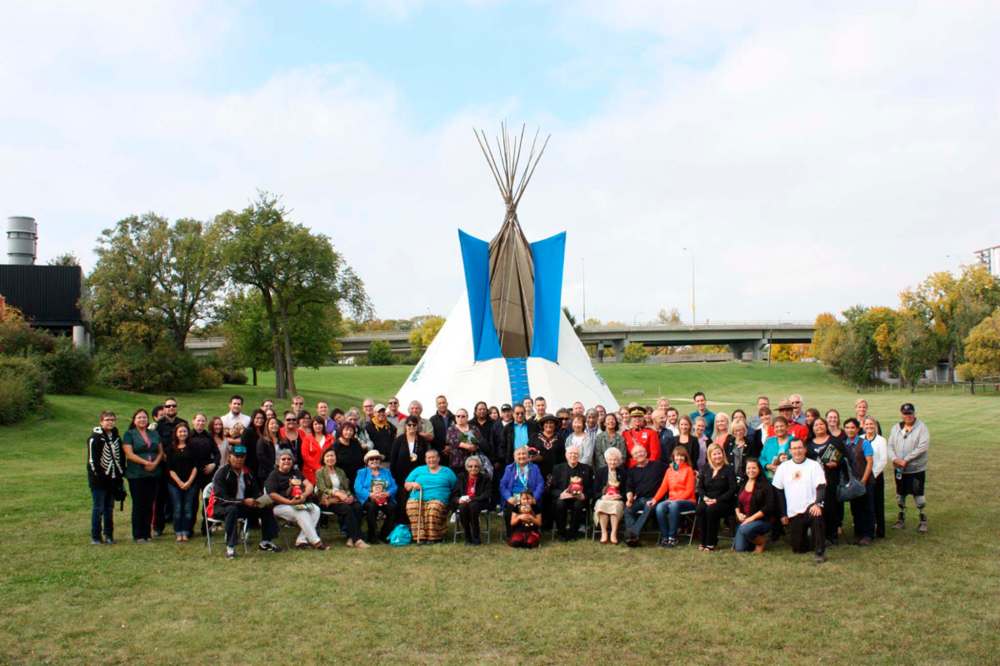City considering new name for park near former residential school to honour Indigenous leader
Request submitted to rename Wellington Park
Advertisement
Read this article for free:
or
Already have an account? Log in here »
To continue reading, please subscribe:
Monthly Digital Subscription
$1 per week for 24 weeks*
- Enjoy unlimited reading on winnipegfreepress.com
- Read the E-Edition, our digital replica newspaper
- Access News Break, our award-winning app
- Play interactive puzzles
*Billed as $4 plus GST every four weeks. Offer only available to new and qualified returning subscribers. Cancel any time.
Read unlimited articles for free today:
or
Already have an account? Log in here »
Hey there, time traveller!
This article was published 19/08/2021 (1292 days ago), so information in it may no longer be current.
AS a residential high school student, the site now known as Wellington Park offered him rare moments of joy.
As an adult survivor of that system, it helped trigger both positive memories and quiet, disturbing flashbacks.
Theodore Fontaine, who died in May, found more than a chance to play hockey and baseball at the Assiniboia Indian Residential School, according to his wife Morgan Fontaine.

“These fields, this was just for him a time of that little taste of freedom that he longed for.… It was just before his seventh birthday (that) he lost his freedom,” she said.
He spent a decade suffering oppression and abuse during his forced attendance at the Fort Alexander Indian Residential School before attending Assiniboia from 1958 to 1960, she said.
While students had to live at Assiniboia away from their families, communities and culture while Theodore attended, she said it still offered a relatively safer space. And he continued to return to the park as he grew older, she said.
“He’d pull up on the edge of the playing field… and just relive some of those memories,” she said.
“He tried to quiet his memories, nightmares and flashbacks of what had happened to him at Fort Alexander School. This (park) was a place that he could sit and let some of that seep out of him onto the land there,” she said.
The city is considering a request to rename Wellington Park to Theodore Niizhota Fontaine Park. On the south side of Wellington Crescent, the green space is located alongside the former residential high school at 621 Academy Rd.
Fontaine became a prominent leader who served as chief of Sagkeeng First Nation and executive director of the Assembly of Manitoba Chiefs, in addition to work as an engineer and federal civil servant.
He also devoted ample time to educating others about the legacy of residential schools, speaking to more than 1,600 organizations.
Morgan believes the new park name would help ensure her late husband’s work lives on, raising awareness about the multigenerational impacts of the residential school system and its goal to eradicate Indigenous culture.
“I think what it means is respect for the identity and the endurance of those students,” she said.
Andrew Woolford, who requested the name change on behalf of the Assiniboia Residential School Legacy Group, said it would go a long way to honour Fontaine’s work.
“This, I think, would be the most meaningful thing we could do to remember him,” Woolford said. “It was really a special place for him and to have it connected to his name would just be, I think, the ultimate tribute.”

The park is currently named after Arthur Wellington Ross, a lawyer, politician and land speculator who owned plenty of property in the Fort Rouge area during the 1880s. The name change application states Ross accumulated his land “by acquiring Métis scrip” as soon as it was issued, which associates him with “Indigenous dispossession.”
Woolford said there are questions about how the land was acquired, but stressed the primary goal for the renaming request is to honour Fontaine. He noted the name Wellington also labels an avenue, a crescent and other spaces.
“Right now, Wellington is a well-preserved name and I think the park has little association with Wellington.… The history of the school takes priority,” he said.
Through the Welcoming Winnipeg: Reconciling our History policy, the city will seek feedback on the proposal until Aug. 26.
“All requests are assessed through a lens of balance, inclusion and Indigenous perspectives,” city spokeswoman Joelle Schmidt said in an emailed statement.
Welcoming Winnipeg is designed to consider naming and renaming requests for places and historical markers, often with the intent to address names that negatively impact the Indigenous community. Name changes can also seek to offer a more balanced perspective of a site’s relevance, honour Indigenous people, educate the public and/or contribute to a “more complete” look at history.
A committee of community members is expected to consider the request in the fall and then make a recommendation for a final city council vote.
joyanne.pursaga@freepress.mb.ca
Twitter: @joyanne_pursaga

Joyanne Pursaga
Reporter
Born and raised in Winnipeg, Joyanne loves to tell the stories of this city, especially when politics is involved. Joyanne became the city hall reporter for the Winnipeg Free Press in early 2020.
Our newsroom depends on a growing audience of readers to power our journalism. If you are not a paid reader, please consider becoming a subscriber.
Our newsroom depends on its audience of readers to power our journalism. Thank you for your support.


